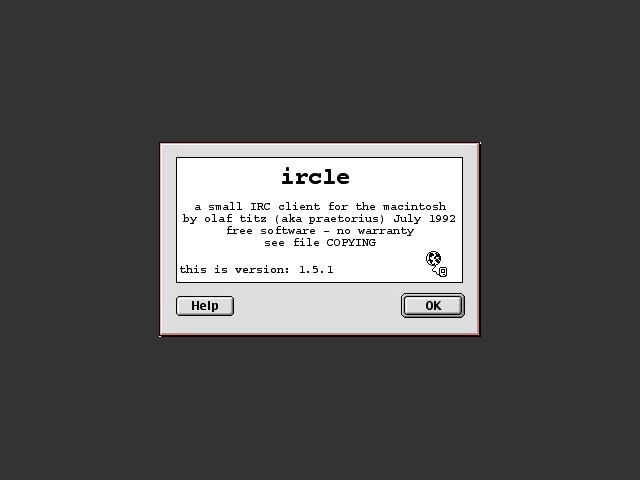Back in the day, Ircle was the premiere program for Internet Relay Chat on the Mac, but today, it lies abandoned. We salute this much-missed app. See what they did there? They took ‘IRC’ – the widely used abbreviation for ‘Internet Relay Chat’ – and used it for the basis of their app’s name, Ircle. In theprogram’s early days, it was known as IRCle, making the connection even moreobvious, but we’ll use its final rendering here.Back in the day, Internet Relay Chat was popular in Internet computing circles. Using a dedicated IRC client (or in some cases, a web interface) you could log on to servers set up to host chats. These servers could host any number of rooms, or channels, covering almost every subject, and the largest servers frequently hosted over 100,000 chatters and hundreds, sometimes even thousands, of channels.Some people consider chatting with people on the Internet instead of going out and meeting ‘real’ people a little sad, but I loved it. When you go down the pub, the people you see there almost all live within a mile of the bar taps, but on IRCyou can meet people from all over the world. These people are just as ‘real’ as people you meet in everyday life (or ‘meatspace’, as IRCers like to call it). And who says chatters use IRC instead of leaving the house? All my online friends had perfectly normal social lives alongside chatting on IRC.
As you’ve probably guessed, I was a big fan of Internet Relay Chat, and Ircle was my chat client of choice. First coded in THINK Pascal by the unfortunately-named Olaf Titz, the Mac-only Ircle was first released in 1993. After version 1.56, released in July 1993, he passed the project on to Onno Tijdgat who rewrote it in C to update it for the PowerPC-based Macs which were emerging at the time. Ircle 3.0, the last ‘full’ update, was released in 1994.
In December 2005, work began on rewriting Ircle for compatibility with the then-new Intel Macs. Backwards-compatibility with the older processors was retained, but support for the Mac’s Classic OS was dropped. The first Universal Binary of the app was released on 21stSeptember, 2006. And after that, things dried up. Work was began on a version 4.0, but it never came out of public beta. The last stable release was version 3.5a6 on 17th November, 2007, and in 2009, it was abandoned altogether.
Why Ircle Ruled
Like its Windows equivalent mIRC, Ircle used multiple on-screen windows. This type of user interface is frowned on today, but back then, it was fairly common. Although it made the app intimidating at first, it gave the chatter a huge degree of control. You could arrange windows for things like the chat console, the list ofusers currently in the room, a list of rooms currently offered on the server and more, however you wanted. Important windows could be given prominence, and less often used ones minimised or covered until they were needed. You could connect to up to ten servers at once and use multiple rooms at the same time, though a lot of operators, or ‘ops’, frowned on multi-channeling. It often led to people being listed as in the room, but not actually taking any notice of it. It was easy to access new servers too, above and beyond those pre-listed in the app. As Alex Charalabidis put it back in 1999, “[Ircle is] the godfather of MacIRC clients. It has been around the longest and has the most features, making itthe de facto gold standard against which all other clients compare themselves.” Maybe one day someone will take up the Ircle project and release a new version for Apple Silicon Macs, but we doubt it. After almost a decade and a half in hibernation, we suspect if anyone was interested in taking it on, they would’ve done it by now. As it stands, it’s been impossible to run Ircle on a recent version of macOS for years, and that doesn’t seem set to change any time soon.There are Mac IRC clients available for current, up-to-date Macs, but none have reached the dizzying heights achieved by Ircle. For the record, the Mac’s current most popular app for IRC is Colloquy (https://colloquy.app), which is available for a low price on the Mac and iOS App Stores. It’s good, but it isn’t Ircle.


